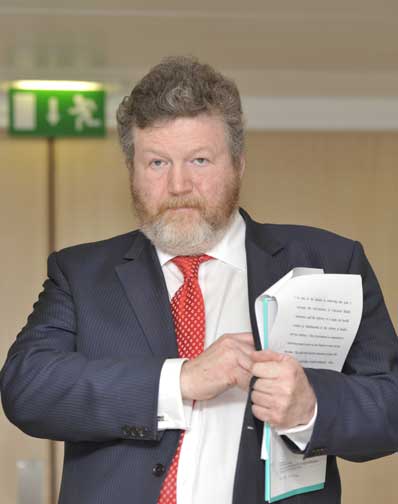


SERVICES
Tuesday February 7, 2012
Calories Counts To Be Compulsory On Irish Menus
Irish Minister of Health, Dr James Reilly believes displaying calories on menus would have a positive effect on Ireland's obesity problem (Photocall) It's commonplace over here, but in Ireland, the idea of making it compulsory for fast food outlets and restaurants to put calorie counts on their menus is causing a bit of a stir. The Food Safety Authority of Ireland has announced a national consultation to seek opinions on the best way of putting calorie information on menus in Ireland. The FSAI claims that Ireland has the second highest levels of obesity in Europe, and research shows that displaying calorie information on menus helps consumers to eat healthier foods and smaller portions. Research here in America found that when calorie information is shown on menus people ate 152 fewer calories in hamburger restaurants; 73 fewer calories in sandwich bars and ate 6% fewer calories overall. Dr. James Reilly, Irish Minister for Health said that if calorie intakes were reduced by this amount there as a result of displaying calories on menus it would have a significant impact on our obesity problem. "In Ireland, two out of every three men and over half of all women are either overweight or obese. Of great concern too is that we are seeing year on year growth in the number of our children and teenagers who are overweight. "Heart disease, cancer, stroke and type 2 diabetes are all conditions aggravated by obesity, particularly when it occurs at younger ages," he said. "We need this type of initiative to help people help themselves to avoid such conditions. Information about the amount of calories you will consume in the foods and drinks you are choosing is fundamental to enabling people make healthier choices. "Displaying calories on menus has been shown to be effective in other countries in this regard. We want to emulate that success here and I have already had a very positive response from fast food outlets and cafés and would strongly encourage the wider food service sector in Ireland to embrace this initiative." According to Dr. Mary Flynn, Chief Specialist Public Health Nutrition, FSAI, one of the key issues is that people are not aware that some snacks they choose provide almost all of the calories they need in a day. "People are choosing large portion sizes for better value. They are welcoming 'free' side dishes, extra toppings as well as sauces with no idea of the amounts of hidden calories they may contain. "At this stage in Ireland, we're used to the 'buckets' of popcorn and litre-sized drinks and we don't notice the extra-thick bread and large rolls in sandwich bars. "On top of all this we'd probably feel cheated if food businesses offered us reasonable portion sizes. In effect all of this promotes oblivious overeating by many of us on a regular basis," she says. "Food businesses supply what consumers demand. Research has shown that putting calories on menus creates a demand for healthier options and smaller portion sizes." But the Restaurant Association of Ireland claimed that putting calories on menus could be too costly for smaller businesses. Chief executive Adrian Cummins claimed one business in Dublin had spent ten thousand euro putting calories on its menus. Dr Flynn acknowledged that not every food business was welcoming the initiative. "We recognize that putting calories on menus will not be an easy task for food businesses - in particular, for smaller food businesses; it will require technical tools to calculate nutritional content and support from nutritional experts. "The FSAI is currently exploring a number of ways that support can be provided to food businesses during any transitional period," she concluded. |
CURRENT ISSUE

RECENT ISSUES


SYNDICATE
[What is this?]
POWERED BY

HOSTED BY

Terms of Service | Privacy Policy
Website Design By C3I






